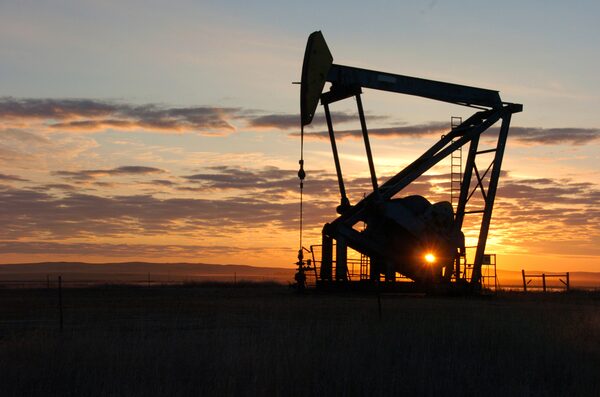
This Nov. 6, 2013, file photo shows a Whiting Petroleum Co. pump jack pulls crude oil from the Bakken region of the Northern Plains near Bainville, Mont. Whiting Petroleum Corp. was once the largest oil producer in North Dakota’s Bakken region.Matthew Brown/The Associated Press
A major U.S. shale producer filed for bankruptcy Wednesday, the largest casualty yet of a global oil price crash.
It is unlikely the insolvency will set off a domino effect into the closely integrated Canadian sector, but it has put the northern patch on notice to tighten operations and finances as much as possible, analysts say.
Whiting Petroleum Corp., once the largest oil producer in North Dakota’s Bakken region, has filed for bankruptcy amid the coronavirus pandemic and an oil price war between Russia and Saudi Arabia that is hammering the price of crude. The downturn has forced oil and gas producers across North America to restructure their debt.
Whiting has seen its market capitalization shrink to US$61.5-million from as much as US$15-billion at its peak in 2011, when investors were first discovering the burgeoning shale sector.
But Canadian producers have some advantages that could protect them from the same fate.
Canadian banks are more hesitant to push companies into receivership than those in the United States, said Calgary-based analyst Jeremy McCrea of Raymond James. Instead, he said, they’re more likely to “kick the can down the road" to avoid swamping the markets with assets.
In addition, corporate balance sheets in the U.S. energy industry tend to be heavier on debt, making them more vulnerable to the current crisis than Canadian companies on average, said Robert Fitzmartyn, analyst at Stifel FirstEnergy.
“On par, they are just using more financial leverage than we do,” Mr. Fitzmartyn said.
Still, Whiting’s move is a signal for the Canadian sector to tread carefully.
“The banks up here will not give you the green light to continue with uneconomic practices, so you still need to be very prudent – shut down your rigs and not pursue foolish spending. If you do that, banks will likely have more flexibility to work with you,” Mr. McCrea said.
"At the same time, it’s a reminder that some [energy companies] will go bankrupt."
The federal government is preparing a multibillion-dollar aid package for the industry, in large part to allow companies to maintain access to credit as their cash flow dwindles because of the oil-price crash. Finance Minister Bill Morneau has said this will include providing guarantees for banks that lend to the sector.
The Globe and Mail reported Tuesday that government officials working on the rescue measures say final announcements are not expected this week.
A record fall in fuel demand – with cars, trucks and aircraft parked because of the COVID-19 contagion – has led to a massive buildup in crude oil stockpiles as refineries cut runs.
U.S. crude stocks rose 13.8 million barrels last week to 469.2 million barrels, a four-year high, according to the Energy Information Administration. At the same time, Saudi Arabia’s crude supply rose on Wednesday to a record of more than 12 million barrels a day, industry sources told Reuters, despite U.S. pressure on the kingdom to stop flooding the market.
Analysts have predicted that gasoline demand will keep falling this month – possibly as much as 30 per cent – as restrictions on movement remain in place around the world. This is raising concern that oil storage facilities from Cushing Okla., to Hardisty, Alta., could be filled to their limits.
That would necessitate more of the continent’s production being slowed or shut down. Indeed, two major U.S. shale oil producers, Pioneer Natural Resources Co. and Parsley Energy Inc., wrote to the Texas energy regulator this week, asking it to hold a hearing to consider curtailing production in the state.
In Alberta, which also faces the prospect of storage tanks filled to capacity, Premier Jason Kenney has ruled out deeper mandated curbs on oil production, saying individual corporations will decide whether to reduce output.
North American producers have already started dialling back production.
Suncor Energy Inc. said last week that it dropped output at its Fort Hills oil sands project by a third. Don Lindsay, chief executive of Fort Hills partner Teck Resources Ltd., said on Wednesday that the partners may eventually decide to shut the operations down, but had made no decisions.
“The partners continue to further analyze capital and operating cost reduction opportunities. And as you might imagine, Teck, certainly, we’re certainly looking at the potential shutdown of the operation,” Mr. Lindsay said during an investor presentation. “However, more work needs to be done, and we will update you as where it progresses.” For its part, Suncor, which operates the project, said the partners had not discussed a shutdown, and such a move would require unanimous approval.
Husky Energy Inc., too, has started shutting down production that is loss-making at current price, and BP PLC announced Wednesday it would also lower output from its shale business and cut investment by $1-billion.
U.S. President Donald Trump said on Tuesday he would join Saudi Arabia and Russia, if need be, for talks about the fall in oil prices, which at current levels would squeeze out higher-cost production, particularly U.S. shale output, which had surged in recent years.
U.S. lawmakers have taken a tough approach – raising the prospect of legislative action if Riyadh does not reduce oil output voluntarily.
Mr. Kenney, too, has voiced his support for an investigation into what he calls “predatory dumping” of oil onto the North American market, and last week proposed joint oil strategy with the United States to try to save the industry. On Tuesday he announced Alberta will inject US$1.1-billion into TC Energy Corp.'s contentious Canada-U.S. oil pipeline as a way to kick-start construction.
With reports from Reuters
Your time is valuable. Have the Top Business Headlines newsletter conveniently delivered to your inbox in the morning or evening. Sign up today.
 Emma Graney
Emma Graney Jeffrey Jones
Jeffrey Jones